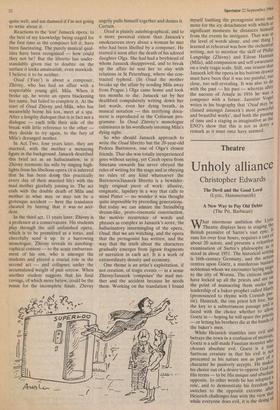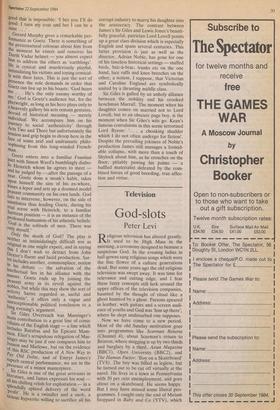Theatre
Unholy alliance
Christopher Edwards
The Devil and the Good Lord (Lyric, Hammersmith)
A New Way to Pay Old Debts (The Pit, Barbican) What enormous ambition the Lyric Theatre displays here in staging the British premiere of Sartre's vast epic. 1`, runs for over four hours, requires a cast at about 20 actors, and presents a relentless examination of Sartre's philosophy as it stood in about 1951. The historical setting is 16th-century Germany, and the action centres upon Goetz, a murderous bastard nobleman whom we encounter laying steg,e to the city of Worms. The citizens instne have locked up all the priests and are 011 the point of massacring them under the leadership of a baker-prophet called HOOT (pronounced to rhyme with Cornish Pas' tie). Heinrich, the one priest left free, bas the key to a subterranean passage and Is faced with the choice whether to allow Goetz in — hoping he will spare the priests c — or letting his brothers die at the hands °' the baker's men. While Heinrich stumbles into evil and betrays the town in a confusion of motives, Goetz is a self-made Faustian monster NO° chooses absolute evil. Goetz is a true Sartrean creature in that his evil is 11°` presented as his nature nor as part of a character he passively accepts. He makes his choice out of a desire to oppose God on His terms — to be His unique and absolute opposite. In other words he has adopted a role, and to demonstrate his freedom he switches to the opposite extreme after Heinrich challenges him with the view that, while everyone does evil, it is the doing 0' good that is impossible: 'I bet you I'll do good: I turn my coat and bet I can be a saint . • •' Gerard Murphy gives a remarkable per- formance as Goetz. There is something of the preternatural colossus about him from the moment he enters and removes his Barth Vadar helmet — you almost expect him to address the others as 'earthlings'. He is cynical and murderously playful, intimidating his victims and toying comical- ly with their fates. This is just the sort of presence the role demands in order that Goetz can live up to his boasts: 'God hears me • • . He's the only enemy worthy of me.' God is Goetz's audience but, for the Playwright, as long as his hero plays only to a heavenly gallery his acts remain gestures, devoid of historical meaning — merely Mdividual. We accompany him on his Journey to social 'authenticity' through Acts Two and Three but unfortunately the tension and grip begin to droop here in the face of some arid and undramatic philo- sophising from this long-winded French- man.
Goetz enters into a familiar Faustian pact with Simon Ward's bumblingly diabo- he Heinrich whom he agrees to meet and be judged by —.after the passage of a Year. Goetz dons a monk's habit, takes upon himself the sins of his ex-whore, kisses a leper and sets up a doomed model Peasant community on his own lands. God fails to intervene, however, on the side of saintliness thus leading Goetz, during his trial scene with Heinrich, to a familiar Sartrean position — it is an instance of the professed humanism of his atheistic beliefs: God is the solitude of men. There was °WY myself.' Only the death of God? The play is neither as intimidatingly difficult nor as ortginal as one might expect, and in saying I don't wish to detract from John uexter's fluent and lucid production. Sar- tre includes another, commonplace, notion tu his debate — the salvation of the Intellectual lies in his alliance with the masses. Goetz ends up by joining the Peasant army in its revolt against the nobles, but while this may show the sort of activity Sartre regarded as useful and authentic', it offers only a vague and unexceptionable political conclusion to a 1(14 evening's argument. Sir Giles Overreach was Massinger's Main contribution to a great line of comic villains of the English stage — a line which Includes Barabas and Sir Epicure Mam- mon. Eliot's scrupulous relegation of Mas- !Inger may be just if one compares him to Junson and Marlowe, but on the evidence of this RSC production of A New Way to pay Old Debts, and of Emrys James's superb central performance, we are in the Presence of a minor masterpiece. Sir Giles is one of the great arrivistes in literature, and James expresses his soul - all his chilling relish for exploitation — in a Splendidly spliced delivery of the word profit'. He is a swindler and a snob, a vicious hypocrite willing to sacrifice all his corrupt industry to marry his daughter into the aristocracy. The contrast between James's Sir Giles and Lewis Jones's beauti- fully graceful, patrician Lord Lovell points up a great class division which is especially English and spans several centuries. This latter provision is just as well as the director, Adrian Noble, has gone for one of his timeless historical settings — stuffed birds, bric-a-brac, trunks etc on the one hand, lace ruffs and knee breeches on the other; a notion, I suppose, that Victorian and Caroline England are symbolically united by a thrusting middle class.
Sir Giles is gulled by an unholy alliance between the nobility and his crooked henchman Marrall. The moment when his daughter comes on married not to Lord Lovell, but to an obscure page boy, is the moment when Sir Giles's wits go. Kean's famous convulsions in this scene terrorised Lord Byron: . a choaking shudder which I do not often undergo for fiction'. Despite the prevailing jokiness of Noble's production James still manages a formid- able collapse, with more than a touch of Shylock about him, as he crouches on the floor, pitiably pawing his palms — a baffled materialist defeated by the com- bined forces of good breeding, true affec- tion and virtue.











































 Previous page
Previous page